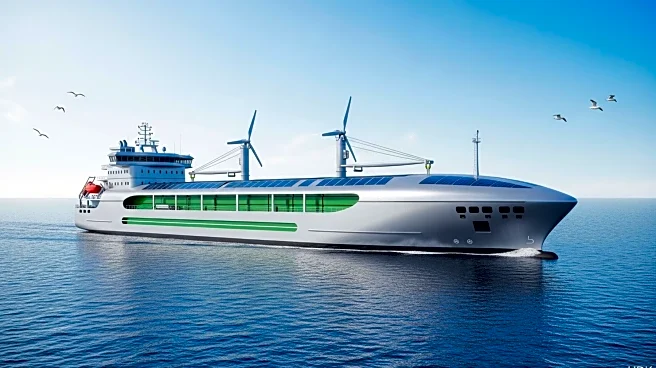What's Happening?
Accelleron is set to launch a significant report at the London International Shipping Week, urging the shipping industry to collaborate with other sectors to pool demand for carbon-neutral fuels. The report highlights the technological advancements in shipping over the past decade that have reduced emissions and enabled the use of carbon-neutral fuels. However, the large-scale production of these fuels at affordable prices remains a challenge. Despite substantial investments in maritime decarbonization, carbon emissions continue to rise, posing a threat to the International Maritime Organization's targets. Accelleron's report combines proprietary modeling and insights from industry peers to address this issue, suggesting that pooling demand for hydrogen-based fuels with sectors like aviation, steel, power, and agriculture could drive scalable investment in production and infrastructure. The report also emphasizes the role of ports in aggregating demand, orchestrating supply chains, and reducing investor risk.
Why It's Important?
The call to decarbonize shipping is crucial as the industry is a significant contributor to global carbon emissions. Achieving net-zero targets is essential for mitigating climate change impacts. The report's emphasis on cross-sector cooperation could lead to innovative solutions and investments in carbon-neutral fuel production, benefiting not only the shipping industry but also other hard-to-abate sectors. This approach could accelerate the transition to sustainable energy systems, aligning with global environmental goals. The success of these initiatives could influence public policy and industry standards, potentially leading to stricter regulations and incentives for adopting cleaner technologies.
What's Next?
Accelleron will present its report at the LISW Global Hub event, followed by a panel discussion and Q&A session. Industry leaders and stakeholders will discuss strategies for overcoming the current stalemate in carbon-neutral fuel production. The event aims to foster collaboration among ports, shipping companies, and other sectors to drive the energy transition. The outcomes of these discussions could shape future investments and policy decisions, encouraging more sectors to adopt sustainable practices. Stakeholders will likely monitor the event's impact on industry trends and regulatory developments.
Beyond the Headlines
The push for decarbonizing shipping highlights broader ethical and environmental considerations. As industries strive to meet net-zero targets, the focus on sustainable practices raises questions about equity and access to clean technologies. The transition to carbon-neutral fuels could also lead to shifts in workforce skills and employment patterns, necessitating retraining and education initiatives. Long-term, these efforts could redefine industry standards and consumer expectations, promoting a culture of sustainability and environmental responsibility.









